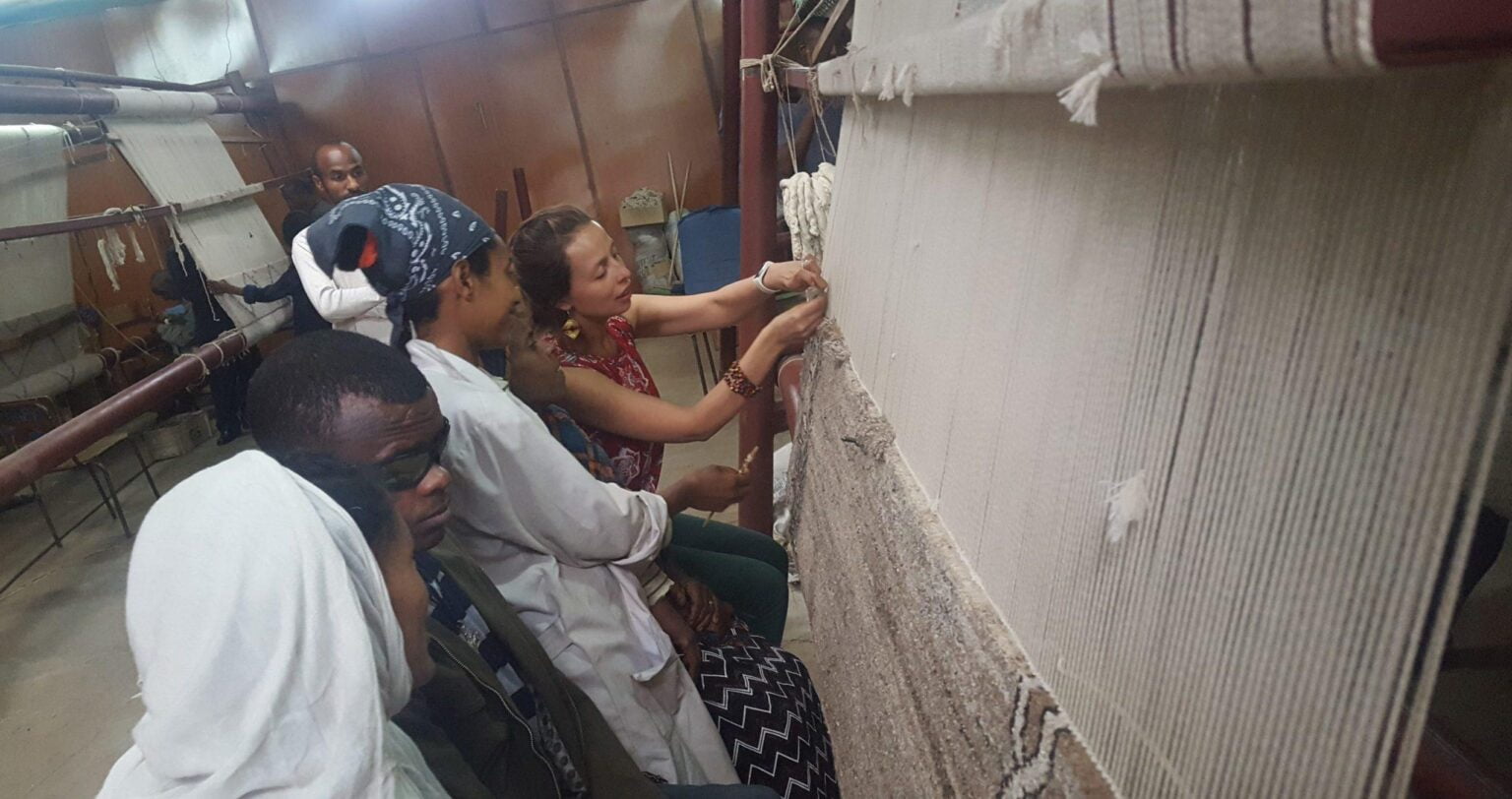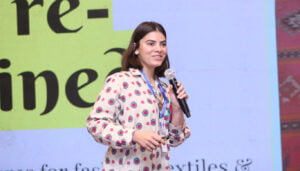Cooperation between disability organisation and company bears fruit in Ethiopia

27 November 2020
With Finnpartnership’s support, Abilis Foundation and Sera Helsinki have created a pattern of cooperation that has opened the market to carpets produced by carpet weavers with disabilities. The partnership helps the two organisations overcome even the hardest of challenges.
Finding a respectable job is not always easy in a developing country like Ethiopia, and it is all the harder for people with disabilities.
Abilis Foundation, which promotes the status of persons with disabilities, and Ethiopian disability organisations have been working together with design carpet manufacturer Sera Helsinki Oy for a few years now. This cooperation has created jobs for nearly 300 people, primarily those with various disabilities.
“Everything started when Sera contacted us and said they were looking to work together with an Ethiopian disability organisation or carpet weaving mill that employs people with disabilities. We liked the idea of employing people with disabilities throughout the value chain. Of course, the business ideology was new, and the situation required some preparation before anything could get started,” says Abilis CEO Marjo Heinonen.
Abilis was already well-acquainted with the country’s disability organisations and had supported weaving mills of disability organisations before. Eventually, talks led to Sera starting to buy carpets manufactured according to their instructions and quality requirements from two organisations.
Finnpartnership’s support is pivotal
At the same time, Abilis was providing the organisations with financial support that enabled them to renovate their work spaces, improve accessibility and procure tools and materials needed for production.
“Among other things, training and quality assurance staff to support the work of visually impaired carpet weavers were also required. The normal project funding provided by the Finnish Ministry of Foreign Affairs was not sufficient to cover all these expenses, so we decided to apply for Finnpartnership’s support,” Heinonen says.
Sera Helsinki has received Business Partnership Support from Finnpartnership in the past to launch their operations and train their staff in Ethiopia.
The support of Finnpartnership allowed Abilis to cover the pay of carpet weavers and instructors for approximately two years and to pay for certain travel from Finland to Ethiopia and within Ethiopia.
“The support has been a significant factor for us. It has been pivotal in identifying disability groups,” Heinonen says.
A strong relationship helps overcome even the biggest challenges
The cooperation between Abilis and Sera Helsinki has been ongoing for a few years now. According to Heinonen, the strong relationship has also helped them overcome setbacks.
“We have encountered resistance to our business ideology in Ethiopia. The disability organisations have been very conservative and wanted to do everything their way. However, we have been successfully producing carpets and expanding our activities.”
Now, the entire carpet production process in Ethiopia is run by persons with disabilities.
The high-quality wool comes from sheep farmers with disabilities in the countryside. Spinners turn the wool into yarn, which is transported to weaving mills in the capital city of Addis Ababa.
Partners lift each other up
In Heinonen’s mind, the division of labour between the organisations and the company is clear. The organisations identify and train persons with disabilities for various tasks. Sera, meanwhile, is responsible for design, quality assurance, sales and marketing.
“Sera and Abilis have complemented each other in a number of ways. We have been in contact with each other regularly – almost daily. We have also solved problems together.”
In the opinion of Abilis Programme Coordinator Hanna Kähkönen, cooperation between the foundation and a company requires an alignment of values and vision, as well as a shared goal. If the two do not align, cooperation is difficult, even impossible.
“Openness, trust and regular communication are prerequisites for success. It is important that challenges are shared and that we keep each other aware of what is happening.”
According to Kähkönen, companies need to understand that the foundation does more than just business collaboration. The foundation, on the other hand, has to remember that companies need to produce a profit to survive and to ensure that business activities are built on solid ground.
Both parties learn from each other
Kähkönen notes that the partnership has been a learning experience for both sides. Abilis has become familiar with the various production stages of hand-made products. It has also learned about the importance of quality and marketing.
“Sera, on the other hand, has learned about disabilities and the challenges people with disabilities face. We have both also come face-to-face with the distrust many people have towards private businesses and the fear of being exploited. However, together we are able to build trust. We have excellent partners in Ethiopia who work at the grassroots level to build trust in accordance with our values.”
Abilis has been active in Ethiopia since 2007. Over the years, it has learned that the Achilles’ heel of employment programmes is limited markets.
“Products do not sell because the same products are copied again and again and there is no design thinking. There is not enough product marketing, and broader business thinking is equally lacking.”
“Thanks to Sera, carpets made by persons with disabilities now have a market that benefits not only the carpet weavers, but also spinners and sheep farmers,” Kähkönen concludes.
Pictures: Abilis Foundation
Share on social media



